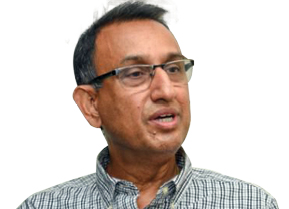 Economic reforms that began in the early 1990s lost their momentum. These initiatives should have been carried forward with robust legal frameworks, resolved procedural hurdles and strengthened institutions. However, higher political leadership failed to prioritise these reforms. Nepal has gone through a long political transition, and all political forces have been focused on gaining power, treating economic issues as secondary.
Economic reforms that began in the early 1990s lost their momentum. These initiatives should have been carried forward with robust legal frameworks, resolved procedural hurdles and strengthened institutions. However, higher political leadership failed to prioritise these reforms. Nepal has gone through a long political transition, and all political forces have been focused on gaining power, treating economic issues as secondary.
Furthermore, every economy has cyclical ups and downs, and Nepal has also experienced these fluctuations. However, we have not been able to adequately address the concerns of foreign and domestic investors. Unless we closely monitor the reform process and address investor demands (which include amending laws, resolving procedural hurdles, and strengthening institutions), it will send a negative signal and hinder our growth potential.
India’s reform process has shown continuity despite political changes, resulting in high growth. In contrast, Nepal’s major political parties have not paid sufficient attention to the economy, focusing instead on political matters. The frequent splits and unifications of communist parties and the fluctuating political base of the Nepali Congress have meant that the latter has also been preoccupied with seeking power. Although the Nepali Congress has a history of contributing to democracy, leading the peace process and promulgating the constitution, it also initiated economic reforms. Therefore, it was the party’s responsibility to keep the economic reform agenda at the forefront.
As a result, Nepal has faced disruptions despite its tremendous potential to leap forward. A comprehensive reform is now essential to fully utilise this potential, especially with the rise of neighbouring India and China. Ultimately, it falls on visionary leadership to direct and implement these initiatives consistently, ensuring that Nepal becomes a competitive and attractive destination for investment.
For broad-based growth, the modernisation of agriculture is a must. This can be analysed in two parts: sustained growth and import-export balance. The volume of agricultural imports increases annually, despite Nepal’s potential to produce enough domestically. Nepal’s unique climate is ideal for high-value fruits and vegetables, which have export potential in markets like China, India and the Middle East. Without a strong and sustainable export base for agriculture and manufacturing, we cannot generate sufficient employment.
The other two key sectors are hydropower and tourism. Nepal has the potential to become a hub for foreign tourists, which would lead to a significant transformation. This is because the tourism industry is highly inclusive and helps boost production and create jobs in semi-urban and rural areas by integrating them into the tourism value chain.
Hydropower has already shown its potential. Nepal has started exporting electricity to both India and Bangladesh. This transition from a power importer to a net power exporter is an incredible achievement. However, Nepal can also leverage the power sector as an enabler for manufacturing, information and communication technology (ICT), and other sectors. Furthermore, cross-border power trade will increase investment potential in Nepal’s power sector. Nepal can diversify its market if cross-border transmission lines are built between Nepal and China (Tibet).
Additionally, the ICT sector has emerged as a major enabler for service sector growth. Given the current trend of distress migration, introducing incentives in the ICT sector and engaging youth would unleash a wide range of opportunities.
We must seriously consider how to increase our export earnings. We need to identify high-value products that can be sold in the markets of India, China and the Middle East, and we should also develop a workforce that can meet the demands of the booming ICT market.
With the new dynamics in global trade, the United States has imposed high tariffs on goods from India and China. Nepal has an opportunity to tap into the U.S. market because our competitiveness is now relatively high. This potential can only be realised if the government makes swift decisions in response to changes in international trade and climate, and if the leadership is visionary.
Nepal must also capitalise on its demographic dividend or youth bulge. However, many young people are undergoing distress migration. Their retention is possible only through comprehensive sectoral reforms and by engaging them in the ICT sector. A large number of Nepalis living abroad have accumulated resources and technical expertise. Attracting investment (both capital and skills) from this diaspora community is highly promising. If we provide them with an easier process for movement and a hassle-free investment environment, they will surely return to their homeland. The issues of dual citizenship or maintaining their identity should be resolved as soon as possible to encourage them to invest in Nepal with confidence.
One of the major challenges I’ve observed is the weakening of institutions. The government, bureaucracy and parliament are not functioning properly, leading to negative socioeconomic and political consequences. It’s difficult for the economy to grow under such conditions. Simply downsizing the administration isn’t enough; accountability, efficiency and productivity are even more critical. In this regard, administrative sector reform is essential for strengthening these institutions.
Another example of weak institutions is the glaring issue in our diplomatic relations. We’ve been losing trust and credibility due to the whimsical decisions of political leaders in conducting diplomacy, which has impacted our ability to explore export destinations and markets.
This is why I’ve been repeatedly emphasising the role of visionary political leadership. Only a visionary leader can strengthen institutions, initiate necessary policy reforms and expedite the law-making process. If you look at the parliament’s role in recent years, the law-making process has become slow and routine, with the parliament being used primarily for forming and toppling governments.
(Acharya is former finance minister)



